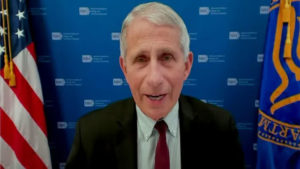 With winter closing in and coronavirus case rates creeping up once again, White House chief medical adviser Dr. Anthony Fauci is warning that the vaccines’ waning immunity combined with the highly transmissible delta variant will make for a “double whammy” that will impact “even the vaccinated people.”
With winter closing in and coronavirus case rates creeping up once again, White House chief medical adviser Dr. Anthony Fauci is warning that the vaccines’ waning immunity combined with the highly transmissible delta variant will make for a “double whammy” that will impact “even the vaccinated people.”
“The somewhat unnerving aspect of it is that if you keep the level of dynamics of the virus in the community at a high level — obviously the people who are most most vulnerable are the unvaccinated — but when you have a virus as transmissible as delta, in the context of waning immunity, that dynamic is going to negatively impact even the vaccinated people. So it’s a double whammy,” Fauci said in a pretaped interview aired at the 2021 STAT Summit Tuesday afternoon.
“You’re going to see breakthrough infections, even more so than we see now among the vaccinated,” he added.
His grim prediction meets a chorus of alarm bells already being sounded about COVID’s renewed spread as more people head inside as the holidays approach, heralding a season of family gatherings.
The national reported average for new cases each day has surged to more than 80,000, according to federal data — the highest in nearly a month. Forty states are currently showing high transmission, and total hospitalizations have increased for the first time in nearly 10 weeks.
Combatting any impending viral onslaught this winter hinges on how many more sleeves roll up for more shots, Fauci said. It won’t only be important to persuade the roughly 60 million “recalcitrant” people who have yet to get their first dose, but also “how well we implement a booster program,” he said.
Fauci added that booster doses of the COVID vaccine may become the standard for a “full” vaccination.
It comes as a growing roster of states and local jurisdictions have pushed ahead of federal regulators’ timeline, electing to endorse the expansion of booster shots to all adults at least six months after their second Pfizer or Moderna shot.
Though Pfizer formally asked the Food and Drug Administration to expand their booster’s authorization last week, right now federal agencies only recommend the mRNA booster for people over the age of 65, have an underlying medical condition or are at high risk for exposure, at least six months after their second dose.
All Johnson & Johnson recipients over the age of 18, however, are eligible for a boost at least two months after receiving their first dose.
“I happen to believe as an immunologist and infectious disease person, that a third shot boost for an mRNA is likely — should be part of the actual standard regimen, where a booster isn’t a luxury; a booster isn’t an add on; and a booster is part of what the original regimen should be — so that when we look back on this, we’re going to see that boosters are essential for an optimal vaccine regimen,” Fauci said.
